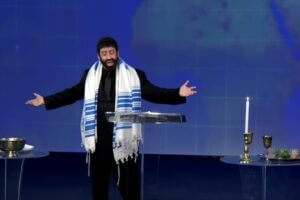I have been involved in numerous local, city and national initiatives related to the body of Christ. Often, our mantra circles around the phrase: “We need unity in the body of Christ.” While that is a good start, it should not be the end game for the church. In John 17:20-23, Jesus’ prayer for the church is that we would be one.
The kind of oneness He was speaking about was akin to the ontological oneness Jesus and the Father have with one another. The Old Testament counterpart to this passage is found in Deuteronomy 6:4b, where it says “The Lord is our God. The Lord is one!” This is not mere unity but a oneness in purpose, essence, mind, heart and passion, which exceeds mere organizational and institutional unity. A lack of oneness in the body of Christ is the reason why we can have hundreds of national prayer rallies without experiencing the results we seek.
In the context of this article, “unity” merely refers to coming together for an event. In it, believers assemble in the same geographic location around a common cause. This can be a weekly occurrence as on a Sunday morning, or it can be a regular pastor’s or marketplace gathering or citywide event. The challenge with this is people are only coming together because of a similar interest in a preacher, worship team or cause, but they have never taken the time to gel together (beyond the event) so that they are of one mind and one heart. In contrast, the early church had great power because they took the time to pray together, dialogue and come to a oneness of heart and soul. This all started after the resurrection when believers came together in unity for 10 days of prayer, comparing Scripture and choosing another apostolic leader (Acts 1:12-26).
This process of unity brought them to a place where God deemed them ready for the outpouring of the Holy Spirit on the day of Pentecost (Acts 2:1-4). The result of this was that the church not only came together (unity), but they had “all things in common” according to Acts 2:44 (oneness), which resulted in the Lord daily adding believers to the church.
Unity was important because it was the catalyst that became the bridge for the church to go into oneness. Unity is the means to the end, but all events should have sufficient follow-through that gives opportunity for oneness to develop. Acts 4:32 says that all the believers were of one heart and soul, then great power and grace was manifested upon them all. Mere unity is only a temporary connection based on a common interest; oneness transcends one event because the common interest is “one another” for the glory of God. This is exactly what the apostle Paul meant when he implored the Corinthian church to be united in the same heart and judgment (1 Cor. 1:10). Based on my observation, very few people in any church, ministry, and organization are really “one.” This is why many entities are in survival mode. There has to be a place where believers can be honest, transparent, committed to one another’s success and have ownership of both the process and the product. When this happens, the synergistic power of God will be manifest.
The following are seven contrasts between unity and oneness:
1. Unity is the process. Oneness is the product.
2. Unity depends upon an event. Oneness transcends an event and knits people together.
3. In unity, people assemble for a common interest. In oneness, people are integrated for kingdom purpose.
4. Unity is the means. Oneness is the end.
5. Unity is how we should start. Oneness is how we should finish.
6. Unity is built upon encouragement. Oneness is built upon purpose.
7. Unity releases temporary momentum. Oneness creates synergy that maximizes purpose.
In closing, if the body of Christ continues to put all its money and effort into events without giving opportunity for oneness to develop among the primary leaders of these events, we will continue to experience the same dismal results. {eoa}
This article originally appeared at josephmattera.org.
See an error in this article?
To contact us or to submit an article
























